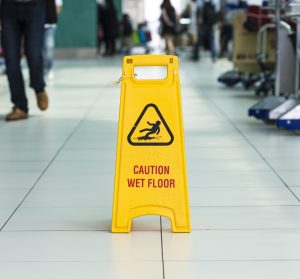
No one wants to see employees hurt on the job, especially if an accident was preventable. Unfortunately, slips, trips and falls can be major and costly accidents in the workplace.
Nearly 20 percent of the workers’ compensation claims filed last year were due to slips and falls. About one-third missed work for a significant time because of their injuries, which can increase the cost of claims dramatically.
With a proper safety plan in place, you could avoid accidents or reduce the severity of accidents, decrease an injured employees’ time away from work and avoid productivity drops. You could also keep your costs in check.
What are the common causes of slips, trips, falls?
Slips, trips and falls can occur on a variety of walking surfaces as well as on ramps and stairways. Some of the major hazards associated with these accidents can include:
Slippery, broken or uneven surfaces
Inadequate spill cleanup
Poor drainage
Weather conditions
Loose rugs or wrinkled carpet
Clutter, poor lighting or obstructed views
8-question checklist for evaluating floor safety
So are the floors at your business safe?…
Read More
 Renting is on the rise, and many homeowners are deciding to rent out their old homes rather than sell them. If you fall into that camp, you’ll want to talk to us about changing your current homeowners insurance policy to a rental policy.
Your insurance
A rental policy will protect your home’s structure and a small amount of furnishings in your home. (If you are renting your home furnished, you can add additional coverage for extra furnishings.) So you’d have coverage for your home if lightening ruined its roof or if a visitor slipped and fell on an icy stoop.
Another important benefit is fair rental value. In the event that your home suffers a loss that is covered and your tenant can’t live in your unit until repairs are made, your policy can provide up to 12 months of fair rental value. This means you won’t lose out on the rental income you may rely on each month.… Read More
Renting is on the rise, and many homeowners are deciding to rent out their old homes rather than sell them. If you fall into that camp, you’ll want to talk to us about changing your current homeowners insurance policy to a rental policy.
Your insurance
A rental policy will protect your home’s structure and a small amount of furnishings in your home. (If you are renting your home furnished, you can add additional coverage for extra furnishings.) So you’d have coverage for your home if lightening ruined its roof or if a visitor slipped and fell on an icy stoop.
Another important benefit is fair rental value. In the event that your home suffers a loss that is covered and your tenant can’t live in your unit until repairs are made, your policy can provide up to 12 months of fair rental value. This means you won’t lose out on the rental income you may rely on each month.… Read More
 Renting is on the rise, and many homeowners are deciding to rent out their old homes rather than sell them. If you fall into that camp, you’ll want to talk to us about changing your current homeowners insurance policy to a rental policy.
Your insurance
A rental policy will protect your home’s structure and a small amount of furnishings in your home. (If you are renting your home furnished, you can add additional coverage for extra furnishings.) So you’d have coverage for your home if lightening ruined its roof or if a visitor slipped and fell on an icy stoop.
Another important benefit is fair rental value. In the event that your home suffers a loss that is covered and your tenant can’t live in your unit until repairs are made, your policy can provide up to 12 months of fair rental value. This means you won’t lose out on the rental income you may rely on each month.… Read More
Renting is on the rise, and many homeowners are deciding to rent out their old homes rather than sell them. If you fall into that camp, you’ll want to talk to us about changing your current homeowners insurance policy to a rental policy.
Your insurance
A rental policy will protect your home’s structure and a small amount of furnishings in your home. (If you are renting your home furnished, you can add additional coverage for extra furnishings.) So you’d have coverage for your home if lightening ruined its roof or if a visitor slipped and fell on an icy stoop.
Another important benefit is fair rental value. In the event that your home suffers a loss that is covered and your tenant can’t live in your unit until repairs are made, your policy can provide up to 12 months of fair rental value. This means you won’t lose out on the rental income you may rely on each month.… Read More
 After a close call in my apartment–who knew
After a close call in my apartment–who knew 

 What Keeps You Awake at Night?
If you are a landlord, perhaps you’d like to rent to people with pets, but the implications worry you too much. In fact, concern about what could happen keeps you awake at night. You imagine that new hardwood floor scratched to pieces, antisocial barking, and tenants with a vicious dog that refuse to leave. Then there is your worst nightmare of the dog attacking another tenant and you being liable. But you can stop worrying because by following these five simple steps, you can rent to pet owners and rest easy.
Advantages of Pet-Owning Tenants
There is a large pool of responsible people out there with good, regular income who are desperately seeking accommodation just like yours. You’d be happy to rent to them, right? If the only thing stopping you is their pet, think again.
Statistics show that pet owners are more likely to have a good, regular income than non-pet owners, and that pet owners are more commonly long-term tenants who move less frequently.…
What Keeps You Awake at Night?
If you are a landlord, perhaps you’d like to rent to people with pets, but the implications worry you too much. In fact, concern about what could happen keeps you awake at night. You imagine that new hardwood floor scratched to pieces, antisocial barking, and tenants with a vicious dog that refuse to leave. Then there is your worst nightmare of the dog attacking another tenant and you being liable. But you can stop worrying because by following these five simple steps, you can rent to pet owners and rest easy.
Advantages of Pet-Owning Tenants
There is a large pool of responsible people out there with good, regular income who are desperately seeking accommodation just like yours. You’d be happy to rent to them, right? If the only thing stopping you is their pet, think again.
Statistics show that pet owners are more likely to have a good, regular income than non-pet owners, and that pet owners are more commonly long-term tenants who move less frequently.…